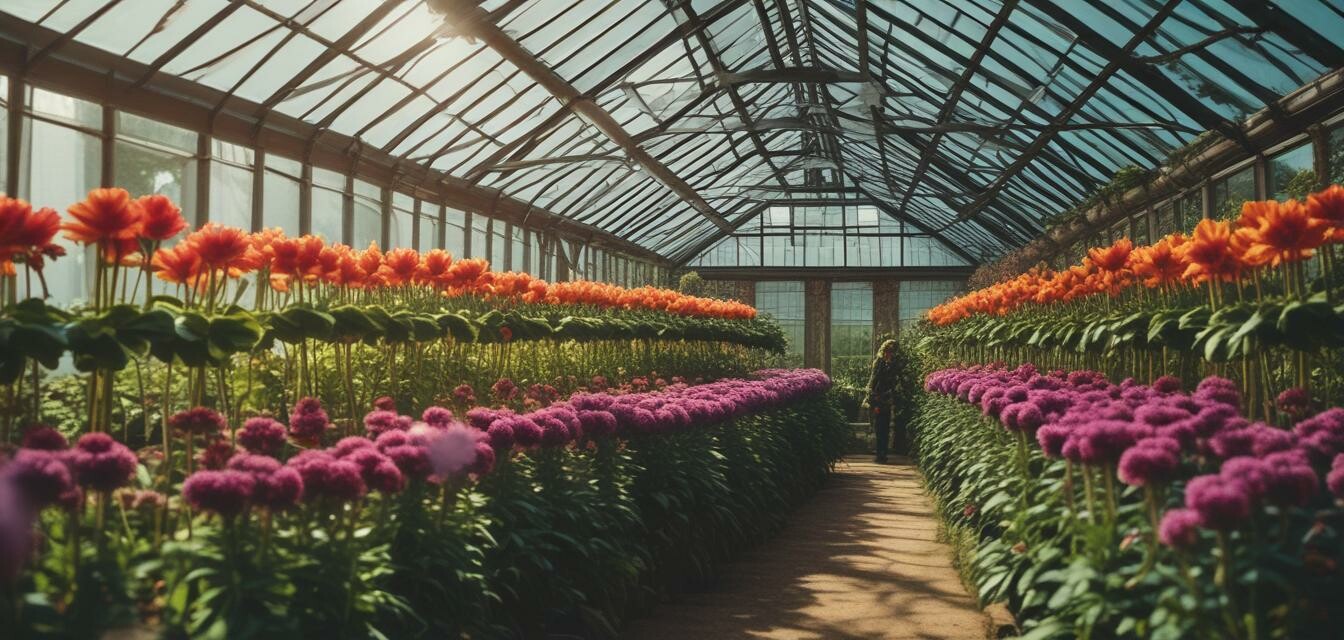
Flowering plants that thrive in greenhouses
Key Takeaways
- Greenhouses create a controlled environment for plants, allowing for year-round blooming.
- Choosing the right flowering plants can enhance your greenhouse’s beauty and productivity.
- Popular flowering plants for greenhouses include geraniums, petunias, and orchids.
- It’s essential to consider light, temperature, and humidity levels for optimal growth.
Greenhouses offer a unique environment for growing a variety of flowering plants, allowing you to create stunning blooms throughout the year. By carefully selecting plants that thrive in these controlled conditions, you can enhance not only the aesthetic appeal of your space but also the overall health and beauty of your greenhouse. This article will explore some of the best flowering plants for greenhouses and provide you with tips for creating a vibrant indoor garden.
Benefits of growing flowering plants in greenhouses
Greenhouses offer several advantages when it comes to gardening, particularly for flowering plants. Here are some key benefits:
- Extended growing season: Greenhouses allow for early planting in spring and extended growing in the fall, providing a longer bloom time.
- Controlled environment: You can regulate temperature and humidity, helping plants to thrive.
- Protection from pests: A greenhouse can provide a barrier against pests and diseases.
- Optimal light conditions: Glass or plastic panels allow natural sunlight to nourish the plants.
Top flowering plants for greenhouse environments
When selecting flowering plants for your greenhouse, it's essential to choose varieties that can easily adapt to the unique conditions. Below is a list of some popular flowering plants known for thriving in greenhouses:
| Plant Name | Light Requirements | Optimal Temperature | Blooming Season |
|---|---|---|---|
| Geraniums | Full sun to partial shade | 65-75°F | Spring to Fall |
| Petunias | Full sun | 65-70°F | Spring to Early Fall |
| Orchids | Filtered sunlight | 70-80°F | Year-round |
| Begonias | Partial shade | 60-70°F | Spring to Fall |
| Fuchsias | Partial shade | 60-70°F | Summer |
Essential care tips for greenhouse flowering plants
To ensure your flowering plants thrive in a greenhouse setting, consider the following care tips:
- Watering: Regularly check soil moisture and water as needed, avoiding overwatering.
- Fertilization: Use appropriate fertilizers to support blooming and plant health.
- Pruning: Regularly prune your plants to promote bushiness and prevent disease.
- Pest management: Keep an eye out for pests and diseases, and take action promptly.
- Ventilation: Ensure proper airflow within the greenhouse to prevent overheating and humidity buildup.
Creating the perfect environment for flowering plants
A successful greenhouse garden thrives on an optimal environment. Here are some recommendations to create the best conditions for your flowering plants:
| Factor | Recommended Level |
|---|---|
| Light | 6-8 hours of direct sunlight per day |
| Temperature | 65-80°F during the day, 55-65°F at night |
| Humidity | 50-70% relative humidity |
| Air Circulation | Regular ventilation to prevent stagnant air |
Inspiration: Designing your greenhouse for blooms
To truly maximize your greenhouse's potential, consider the design and layout. Here are some inspiring ideas:
- Mixing heights: Include plants of varying heights to create visual interest.
- Color coordination: Choose flowering plants with complementary colors for a stunning effect.
- Use of containers: Incorporate decorative pots to add style and even more variety.
- Creating pathways: Designate walkways for easy access among your blooming plants.
Conclusion
Growing flowering plants in a greenhouse can be incredibly rewarding. By choosing the right varieties and providing the ideal environment, you can enjoy vibrant blooms that enhance your outdoor space. Remember to experiment with different plants and designs to discover what works best for you.
Tips for beginners
- Start with easy-to-grow plants before moving on to more advanced varieties.
- Keep a gardening journal to track your plants' progress and your care routine.
- Don't hesitate to seek advice from fellow gardeners or local gardening clubs.
- Explore our buying guides for tips on selecting the right plants and supplies.
Pros
- Controlled growth conditions.
- Longer blooming periods.
- Protection from weather extremes.
Cons
- Initial setup costs can be high.
- Maintenance can be labor-intensive.